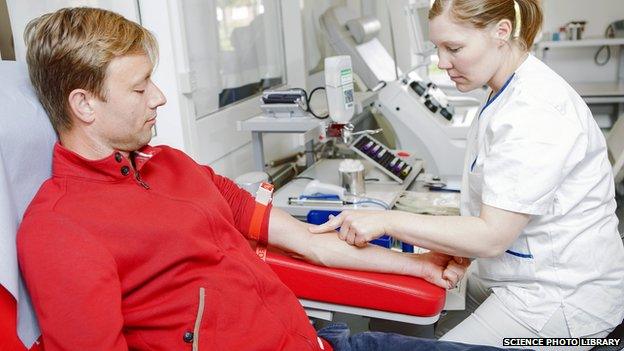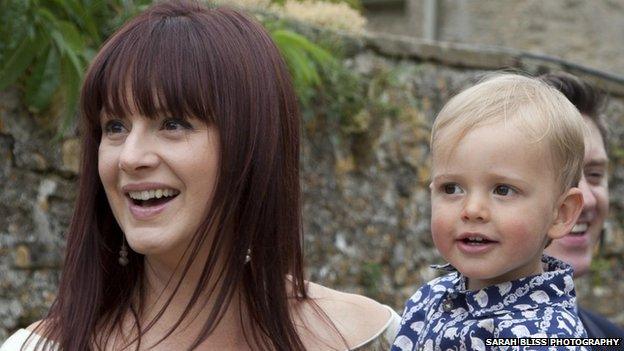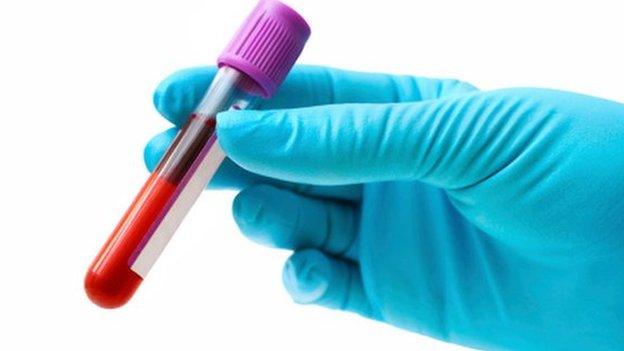NHS Blood and Transplant call for new donors after stark drop
- Published
- comments

New donors are needed to ensure future stock
A campaign is calling for new blood donors in England and Wales following a 40% drop in fresh volunteers in the past decade.
NHS Blood and Transplant says 120,000 fewer people joined the blood donor register in 2014-15 than in 2004-05.
It believes one of the main reasons is the increasing pressure on people's free time - citing longer commutes and the distractions of social media.
The blood unit is calling for 204,000 new volunteers to start donating.
Blood services in Scotland also say they have fewer volunteers coming forward and are concerned.
"We simply can't ignore the fact that there has been a stark reduction in the number of new donors coming forward - a trend seen across the world," said Jon Latham, assistant director for donor services and marketing at NHS Blood and Transplant (NHSBT), which provides blood supplies for England and north Wales.
Richard Shortland from NHS Blood and Transplant told BBC Breakfast the NHS are doing what they can in order to make it easy for people to donate
Only about 3-4% of the current eligible population in this area are regular donors.
He said that although the unit had enough stock for this year, this campaign was about "future-proofing for the next few years".
"We need these [new donors] to make sure it doesn't become critical," he told the BBC News website.

'It was really terrifying'

Bethany, 37, needed an emergency blood transfusion after a ruptured ectopic pregnancy caused internal bleeding.
She was about seven weeks' pregnant when she felt a popping inside her followed by intense abdominal pain.
She was taken to St Mary's Hospital in Paddington, London, drifting in and out of consciousness, and quickly transferred to the operating theatre for a three-hour operation.
"It was really terrifying," said Bethany, who was living in Brentford at the time.
"From being in the A&E assessment to going into theatre was probably about 10 minutes.
"My husband said it was traumatic to watch, he was completely helpless. They said afterwards I'd lost a lot of blood."
Bethany had been a blood donor herself beforehand, giving about four or five units.
Because she has had a transfusion, she can no longer donate, but she persuaded her husband to overcome his fear of needles and become a donor in her place.

"We know that people's lives have got busier over the last decade", said Mr Latham.
"People are working longer hours, commuting further, spending more time online and have less time of their own, despite more options of how to use it," he said.
The increasing popularity of exotic travel, tattoos and acupuncture, all of which might mean a donation needs to be delayed, could also explain the fall in donors, he added.
The other reasons given for the dip are:
a changing demographic that may be linked to less awareness of donor need
the amount of good causes competing for people's time
the move to an appointment-based system that may put people off spontaneous donations
"While we can meet the needs of patients now, it's important we strengthen the donor base for the future," Mr Latham said.
As about half of the NHSBT's current donors are over the age of 45, the unit is particularly calling for younger people to donate to ensure future stocks.
Black, Asian and minority ethnic people make up 14% of the eligible donor population in England and north Wales, but only 5% of them have given blood in the past 12 months.
Conditions such as sickle cell disease and thalassaemia are more prevalent among these people, and those affected require regular blood transfusions, ideally from donors with similar ethnic backgrounds.
The unit is also particularly interested in O-negative blood donors, as this type of blood can be given to anyone, regardless of their own blood group.

Who can donate and how?
Healthy 17- to 65-year-olds weighing at least 50kg (7st 12Ib) can donate
Men can donate four times a year, women three
About 470ml (just under a pint) is taken
With an appointment, it should take no more than an hour
A delay may be required after foreign travel,, external a tattoo or acupuncture

- Published3 December 2014

- Published20 December 2010